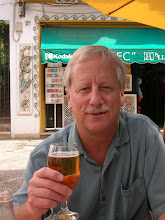I just finished Matt Ridley's book The Origins of Virtue. It was a great pleasure to read because it consistently managed to stand particular ideas of mine on their heads. Ridley persuasively argues that humans have social instincts, ultimately to be trustworthy. Virtuous behavior has been selected for by our genes.
The Selfish Gene is, of course, a famous book by Richard Dawkins (which I have not read) about a revolution in biology. At its core, the idea is that "individuals do not consistently do things for the good of their group, or their families, or even themselves. They consistently do things that benefit their genes because they are all inevitablly descended from those that did the same. None of your ancestors died celibate."
This conception solved some mysteries in biology. Social insects who help their sisters to breed rather than trying to breed themselves, left more copies of their genes in the next generation. "From the gene's point of view, therefore, the astonishing altruism of the worker ant was purely, unambiguously selfish." But how does that leave space for altruism?
Classical economists had supposed that people act out of self-interest. However, this idea revealed a much more powerful engine of behavior. "Selfish genes sometimes use selfless individuals to achieve their ends. Suddenly, therefore, altruism by individuals can be understood." People really do act selflessly because this tendency is selfishly useful for their genes.
What makes human beings different is culture, which leads to a different kind of evolution; a competition not just between genes, but between culturally different individuals or groups. "A person may thrive at the expense of another not because he has better genes, but because he knows or believes something of practical value."
There is one kind of cultural learning that makes cooperation more likely: conformism. It must be remembered that we evolved as small groups of hunter/gatherers, so conformisn strengthened the group. Thus, we get the tendency that it is usually cheaper and better to do what other people say. Humans have always fragmented into hostile and competitive tribes. This leads to our tendency to perceive the world in terms of us or them (the competing group). And war. This is the dark side of our social instincts.
The book also makes use of game theory; in particular, strategies for dealing with prisoner's dilemmas, a difficulty that occurs whenever there is a conflict between self-interest and the common good. This is a situation where each indidividual in a group will rationally choose a course of action that is not really in his own self-interest, another mind-boggling concept.
The book is full of wonderful anthropological studies, including many hunter/gatherer societies we have encountered in the modern age, and comparative biology between species. Once again, I am forced to realize how little I know, but that just means that there are more interesting surprises in store. On to Genome.
Wednesday, December 30, 2009
Subscribe to:
Post Comments (Atom)




No comments:
Post a Comment